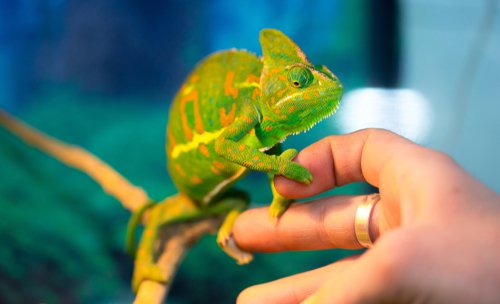Taking Care of Reptiles
Taking Care of Reptiles

Reptiles can make fascinating and rewarding pets, but they do require specialized care to thrive in captivity. If you're considering adding a reptile to your household, it's important to understand the basic principles of reptile care.
Reptiles can make great pets for those interested in a unique and fascinating companion. Whether you are a seasoned reptile owner or new to the hobby, there are a few general care guidelines that should be followed to ensure the health and happiness of your pet.
Enclosure for Reptiles
The enclosure should be appropriate for the species of reptile and provide ample space for them to move around and explore. A substrate that is safe and easy to clean should also be used. Heat and lighting sources should be provided as needed to create a comfortable environment for the reptile. Reptiles require specific environmental conditions in order to stay healthy. This includes proper lighting, temperature, humidity, and substrate. Different species of reptiles have different requirements, so it's important to do your research and choose a species that fits your lifestyle and the environment you can provide.It's also important to regularly clean and maintain your reptile's enclosure. This includes removing waste, cleaning surfaces, and providing fresh water. Proper hygiene and sanitation are critical for preventing the spread of disease.
Temperature and Humidity
Different reptile species have different temperature and humidity requirements, so it's important to research the specific needs of your pet. Appropriate thermometers and hygrometers should be used to monitor these conditions and ensure they are within the optimal range.
Reptile Diets
Reptiles are diverse in their dietary needs, ranging from herbivorous to carnivorous. It's important to research the specific dietary requirements of your pet and provide them with a nutritionally balanced diet. Live prey should be provided as appropriate for the species, and any food items should be appropriately sized to prevent choking or other health problems. Reptiles also require a balanced and varied diet. Some reptiles are strictly herbivorous, while others are carnivorous or omnivorous. Providing your reptile with a diet that meets their nutritional needs is essential for their health and well-being.
Reptile Handling
While some reptiles can be quite docile and enjoy being handled, others may be more skittish or prone to aggression. It's important to understand the temperament of your pet and handle them appropriately to prevent stress or injury. One of the most important aspects of reptile care is providing proper socialization and environmental enrichment. This can include providing toys, hiding places, and opportunities for exercise and exploration. Reptiles are intelligent animals and can become bored and stressed without proper stimulation.
Veterinary Care
Reptiles should receive regular veterinary check-ups to monitor their health and prevent or treat any health problems that may arise. It's important to find a veterinarian who specializes in reptile care, as they will have the expertise and equipment necessary to provide the best possible care for your pet.
Reptiles can make wonderful and rewarding pets for those willing to put in the time and effort required to care for them properly. With proper care and attention, your reptile companion can thrive and provide years of enjoyment and fascination.




